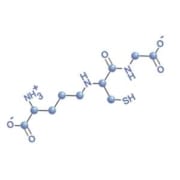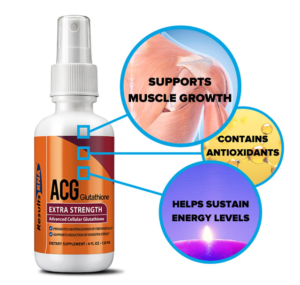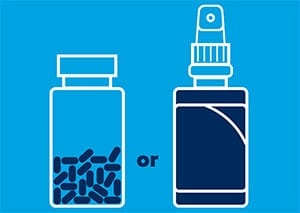Glutathione Supplementation: What Are The Health Benefits?
Found in every cell of the body, glutathione is one of the most important naturally occurring compounds, and has a long list of health benefits. Intra-oral glutathione supplementation allows the cells to utilize glutathione to protect themselves from damage and to aid in detoxifying harmful compounds.
Over 130,000 scientific papers, as cited on PubMed, have established that maintaining adequate cellular glutathione levels is one of the most important keys to optimal cellular function. This is usually achieved through glutathione supplementation.
What is Glutathione, and what can it do for your body?

Glutathione is a small protein molecule composed of the amino acids glutamate, glycine, and cysteine. The liver is the primary reservoir for glutathione and its potent antioxidant activity is essential for the liver’s role in detoxifying harmful compounds that enter our body. Conditions and lifestyle choices that negatively affect liver health can result in glutathione depletion.
Known as the “master antioxidant,” glutathione directly quenches numerous free radicals and is critical to the recycling and proper utilization of other antioxidants, such as vitamins C and E.6
Glutathione status is a sensitive indicator of cell function and viability. As intracellular glutathione levels become depleted, cellular functions become increasingly compromised, leading to eventual cell death. In humans, glutathione depletion is linked to a number of serious health problems.
Numerous functions in the body benefit from adequate cellular glutathione, including:
- Immune health
- Cognitive health
- Pulmonary health
- Cardiovascular health
- Ocular health
Health Benefits of Glutathione
 These recent studies have firmly established that oral glutathione supplementation can be absorbed and produce the desired benefits:
These recent studies have firmly established that oral glutathione supplementation can be absorbed and produce the desired benefits:
- Antioxidant Effect: Glutathione quenches numerous free radicals that are known to be involved in various health problems and are critical to recycling and utilization of other antioxidants.
- Cellular Function: Glutathione is required for the manufacture of many cellular proteins, is involved in the synthesis and repair of DNA, and is a cofactor for many cellular enzymes involved in overall cell function.
- Detoxification: Glutathione is the body’s premier detoxifying agent. Glutathione binds toxins, environmental pollutants, and drug metabolites, excreting them through the urine or the gut.
- Immune System Support: Glutathione is critical to immune system modulation. It enhances the underactive functions of the immune system and helps to dampen and balance overactive aspects, to help maintain immune system homeostasis.
- Stamina and Endurance – Glutathione supplementation has been shown to improve lipid metabolism and acidification in skeletal muscles during exercise, leading to decreased muscle fatigue.
Can Glutathione be Taken by Athletes?
Athletes are continually looking for ways to minimize muscle fatigue or damage during intense or endurance training in order to improve performance. Thus, glutathione supplementation for athletes is ideal.

A recent study shows that physical exercise decreases the reduced form of glutathione and if exercise is prolonged, has been shown to decrease total plasma and tissue glutathione content over time. This may suggest that glutathione may be associated with energy metabolism and maintenance of muscle contraction. The conclusion, then, is that glutathione supplementation improves lipid metabolism and acidification in skeletal muscles during exercise, which leads to less muscle fatigue.
An animal model of glutathione depletion demonstrated a significant increase in oxidative stress during exercise. There was also a reduction in total glutathione in the skeletal muscle of animals who exercised, compared to the sedentary control animals.
The research team also conducted a double-blind, cross-over study involving eight healthy men (average age, 36 years) who received either glutathione or placebo for two weeks. The impact of glutathione intake on exercise-induced muscle metabolism and fatigue in humans was evaluated. Results demonstrated that supplementing with glutathione induces aerobic metabolism and improves an acidic environment in skeletal muscle during exercise, which may aid in reducing exercise-induced muscle fatigue and damage.
By far, the most effective form of oral glutathione supplementation is the Intra-oral spray. Intra-oral spray technology promotes more rapid absorption and superior efficacy.
Increasing Need for Glutathione
 Glutathione levels naturally decline as we age or when we are exposed to environmental pollution, toxins, drugs, and other oxidative agents.
Glutathione levels naturally decline as we age or when we are exposed to environmental pollution, toxins, drugs, and other oxidative agents.
Even acetaminophen (Tylenol®), a commonly used over-the-counter pain reliever, can cause glutathione levels to plummet.
Numerous health conditions are characterized by low levels of glutathione, particularly those associated with aging and cognitive decline.
With progressively more health issues having an association with glutathione depletion, oral supplementation is a viable preventive, anti-aging strategy. However, to be effective, the glutathione being used must be rapidly bioavailable.
There are three main forms of supplemental glutathione currently available:
L-glutathione or Reduced Glutathione
This form is the active or reduced form of glutathione (GSH). The bulk of glutathione research has been conducted using reduced glutathione.
Liposomal Glutathione
This form is complexed with phosphatidylcholine and is well absorbed into the cellular matrix. This form of glutathione can be expensive. It may also be confined to the delivery site and not distributed systemically and may have an offensive taste or odor.
S-Acetyl Glutathione
This is the most stable and effective form of oral glutathione. It is absorbed intact and has no offensive taste or smell. The attachment of an acetyl group protects glutathione from oxidation in the digestive tract, rendering it more stable. Studies show that it more readily crosses the cell membrane than glutathione itself. When provided in an Intra-oral spray, this form has superior bioavailability.
Intra-oral Absorption of Glutathione vs Traditional Forms of Supplementation
Historically, there has been some controversy with glutathione supplementation. It was thought that glutathione may not be absorbed when taken orally. In one study, a single dose of 3,000 mg glutathione failed to increase glutathione levels in the blood.
Is supplementation a waste of time then? No, read on!
Rapid Bioavailability

There was a study done on ACG Glutathione Extra Strength (intra-oral spray delivery)by an independent clinical research firm to effectively increase intracellular levels of GSH by over 10% in only 7 hours.
The significant efficacy of advanced cellular Intra-oral sprays is achieved by atomized spray delivery, rapid absorption, and increased bioavailability of key molecules. ACG Glutathione Extra Strength contains both reduced glutathione and S-Acetyl Glutathione along with important precursors.
The intra-oral spray is the most effective delivery system for supplemental glutathione.
Who Should Supplement Glutathione?
It is evident that glutathione offers many health benefits to the human body. While Intra-oral glutathione supplementation is beneficial to everyone, it is especially crucial to those who participate in endurance training or are dealing with persistent health issues. To learn more about glutathione supplementation as it pertains to athletes, click here.
References:
1. Kosower NS, Kosower EM. The glutathione status of cells. Intl Rev Cytol 1978;54:109-157.
2. PubMed.gov search for peer-reviewed, published articles on glutathione. https://www.ncbi.nlm.nih.gov/pubmed/?term=glutathione. Accessed Ma.y 2, 2017
3. Kidd PM. Glutathione: systemic protectant against oxidative and free radical damage. Altern Med Rev 1997;1:155-176.
4. Sen CK. Nutritional biochemistry of cellular glutathione. Nutr Biochem 1997;8:660-672
5. Anderson ME. Glutathione and glutathione delivery compounds. Adv Pharmacol 1997;38:65-7
6. Meister A. Glutathione, ascorbate, and cellular protection. Cancer Res 1994;54:1969S-1975S.
7. Gul M, Kutay FZ, Temocin S, et al. Cellular and clinical implications of glutathione. Indian J Exp Biol 2000;38:625-634
8. Witschi A, Reddy S, Stofer B, Lauterburg BH. The systemic availability of oral glutathione. Eur J Clin Pharmacol 1992;43:667-669.
9. Park EY, Shimura N, Konishi T, et al.Increase in the protein-bound form of glutathione in human blood after the oral administration of glutathione. J Agric Food Chem 2014;62:6183-6189.
10. Richie JP Jr, Nichenametla S, Neidig W, et al. Randomized controlled trial of oral glutathione supplementation on body stores of glutathione. Eur J Nutr. 2015;54:251-263.
11. Kessoku T, Sumida Y, Imajo K, et al. Efficacy of Glutathione for the Treatment of Non-Alcoholic Fatty Liver Disease: An Open-Label, Multicenter, Prospective Study. J Heptol 2016;64:S425-S630.
12. Fang Y.-Z., Yang S., Wu G. Free radicals, antioxidants, and nutrition. Nutrition 2002;18:872–879.
13. Sen C.K. Redox signaling and the emerging therapeutic potential of thiol antioxidants. Biochem Pharmacol 1998;55:1747–1758
14. Monks TJ, Lau SS. Glutathione conjugation as a mechanism for the transport of reactive metabolites. Adv Pharmacol 1994;27:183-205.
15. Mulder GJ, Ouwerkerk-Mahadevan S. Modulation of glutathione conjugation in vivo: how to decrease glutathione conjugation in vivo or in intact cellular systems in vitro. Chem-Biol Interact 1997;105:17-34.
16. Ketterer B., Coles B., Meyer D.J. The role of glutathione in detoxication. Environ Health Perspect 1983;49:59–69
17. Pace GW, Leaf CD. The role of oxidative stress in HIV disease. Free Rad Biol Med 1995;19:523-528.
18. Herzenberg LA, De Rosa SC, Dubs JG, et al. Glutathione deficiency is associated with impaired survival in HIV disease. Proc Natl Acad Sci 1997;94:1967–1972.
19. Jones DP, Mody VC Jr, Carlson JL, et al. Redox analysis of human plasma allows separation of pro-oxidant events of aging from decline in antioxidant defenses. Free Radic Biol Med. 2002;33:1290–1300.




